Unit 12: Organizational Behavior - Effective and Ineffective Teams
VerifiedAdded on 2023/01/11
|11
|740
|93
Report
AI Summary
This report delves into the core concepts of organizational behavior, specifically contrasting effective and ineffective teams. It outlines the characteristics of both, emphasizing factors such as focus, clear roles, leadership, trust, communication, and time management. The report also explores the application of Belbin's theory in understanding team roles, with a focus on a manager's role in Waitrose. Furthermore, it examines the path-goal theory of leadership, highlighting how leaders can motivate employees by adapting their behavior to the needs and environment of their workforce, and how motivational factors impact employee satisfaction. The report concludes by referencing the relevant academic sources that support the analysis of organizational behavior.
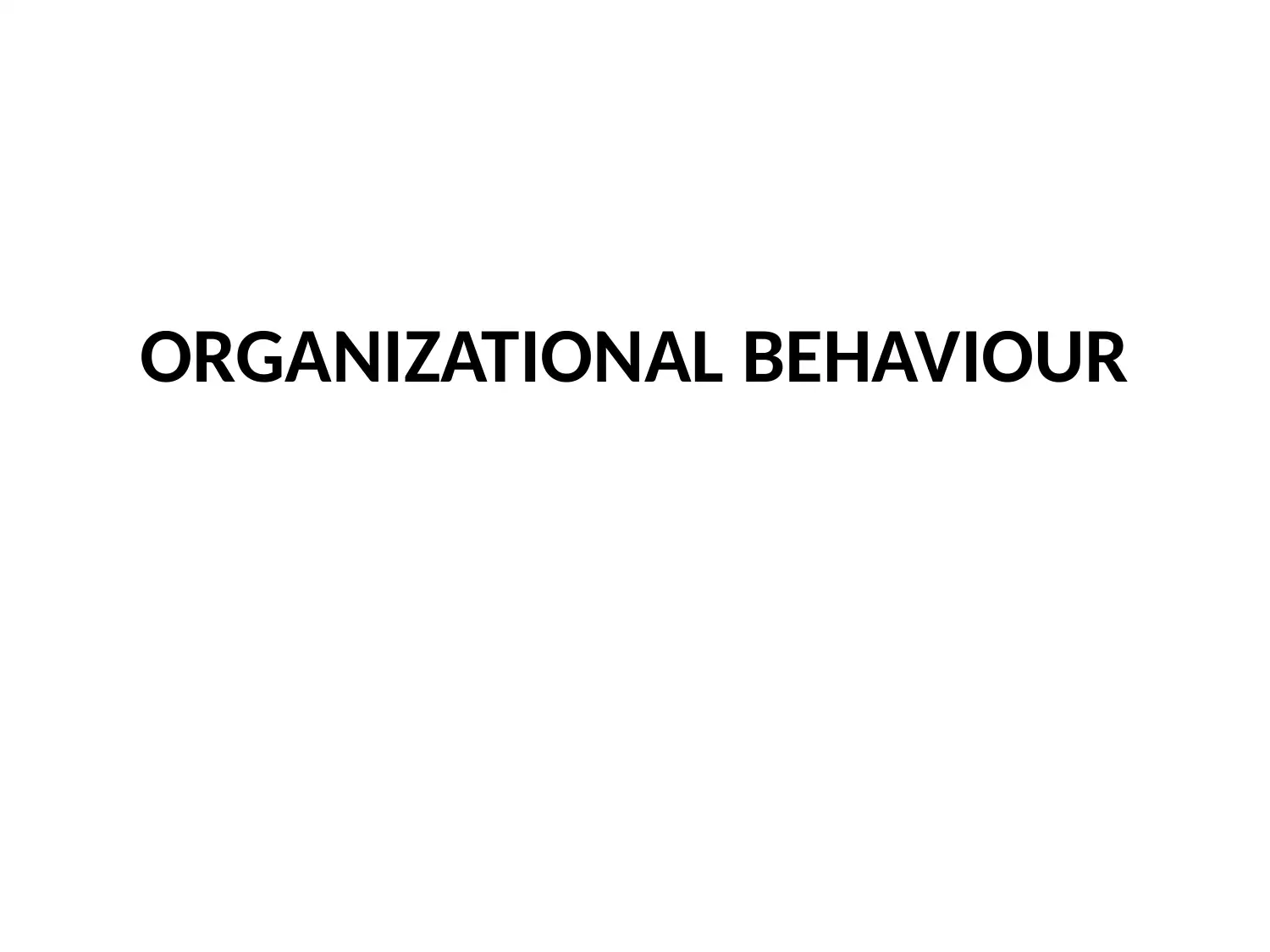
ORGANIZATIONAL BEHAVIOUR
Paraphrase This Document
Need a fresh take? Get an instant paraphrase of this document with our AI Paraphraser
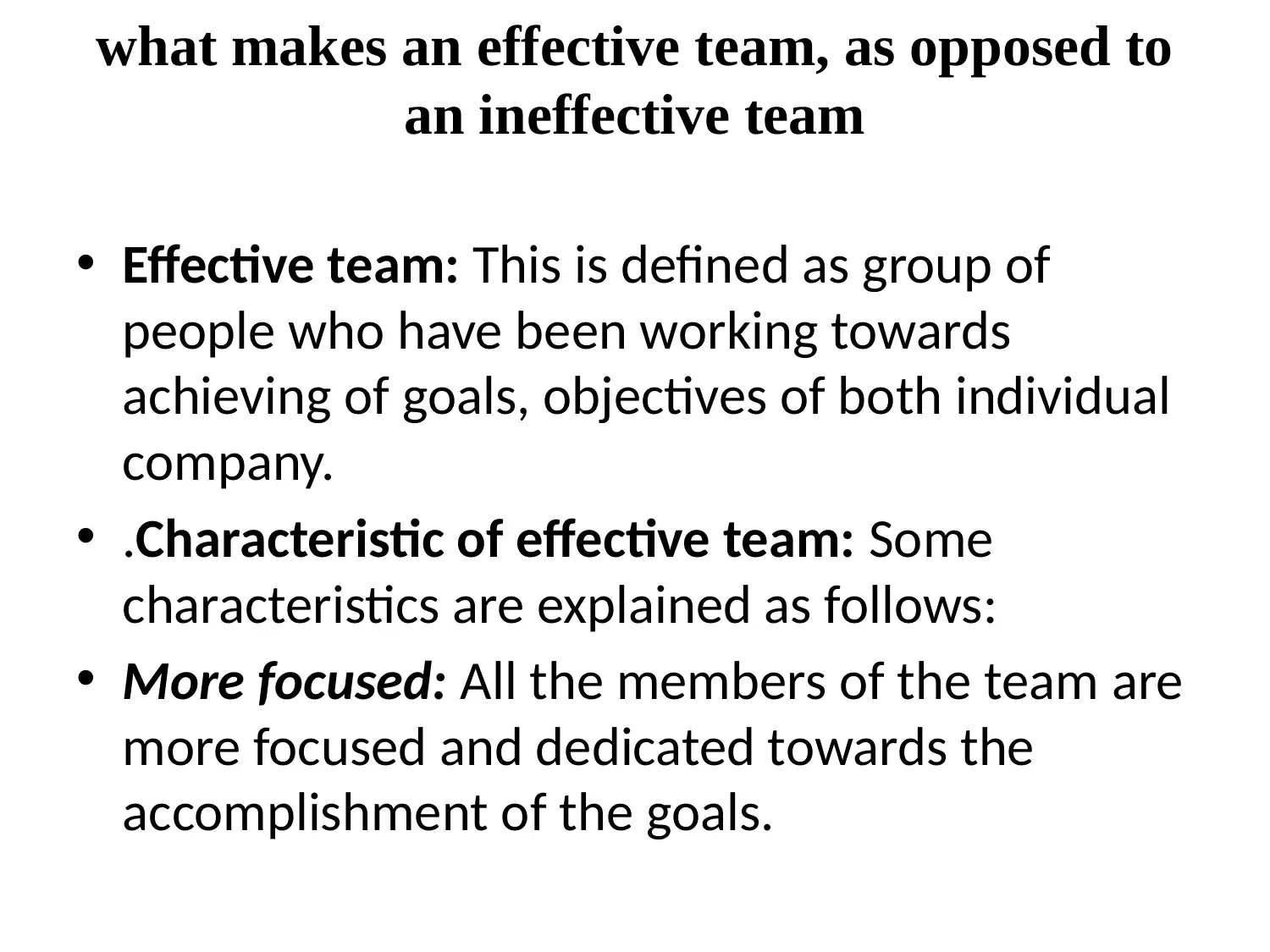
what makes an effective team, as opposed to
an ineffective team
• Effective team: This is defined as group of
people who have been working towards
achieving of goals, objectives of both individual
company.
• .Characteristic of effective team: Some
characteristics are explained as follows:
• More focused: All the members of the team are
more focused and dedicated towards the
accomplishment of the goals.
an ineffective team
• Effective team: This is defined as group of
people who have been working towards
achieving of goals, objectives of both individual
company.
• .Characteristic of effective team: Some
characteristics are explained as follows:
• More focused: All the members of the team are
more focused and dedicated towards the
accomplishment of the goals.
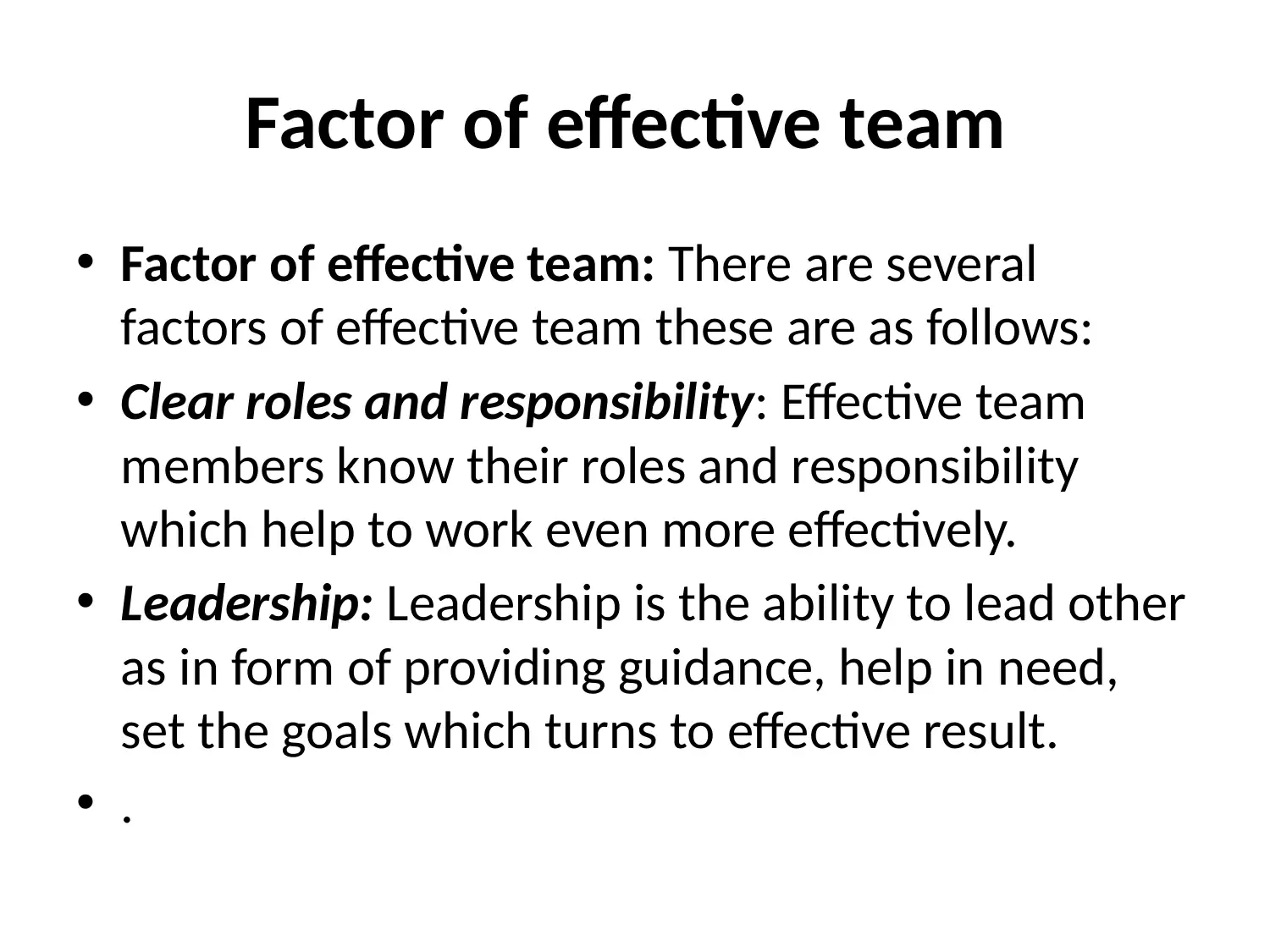
Factor of effective team
• Factor of effective team: There are several
factors of effective team these are as follows:
• Clear roles and responsibility: Effective team
members know their roles and responsibility
which help to work even more effectively.
• Leadership: Leadership is the ability to lead other
as in form of providing guidance, help in need,
set the goals which turns to effective result.
• .
• Factor of effective team: There are several
factors of effective team these are as follows:
• Clear roles and responsibility: Effective team
members know their roles and responsibility
which help to work even more effectively.
• Leadership: Leadership is the ability to lead other
as in form of providing guidance, help in need,
set the goals which turns to effective result.
• .
⊘ This is a preview!⊘
Do you want full access?
Subscribe today to unlock all pages.

Trusted by 1+ million students worldwide
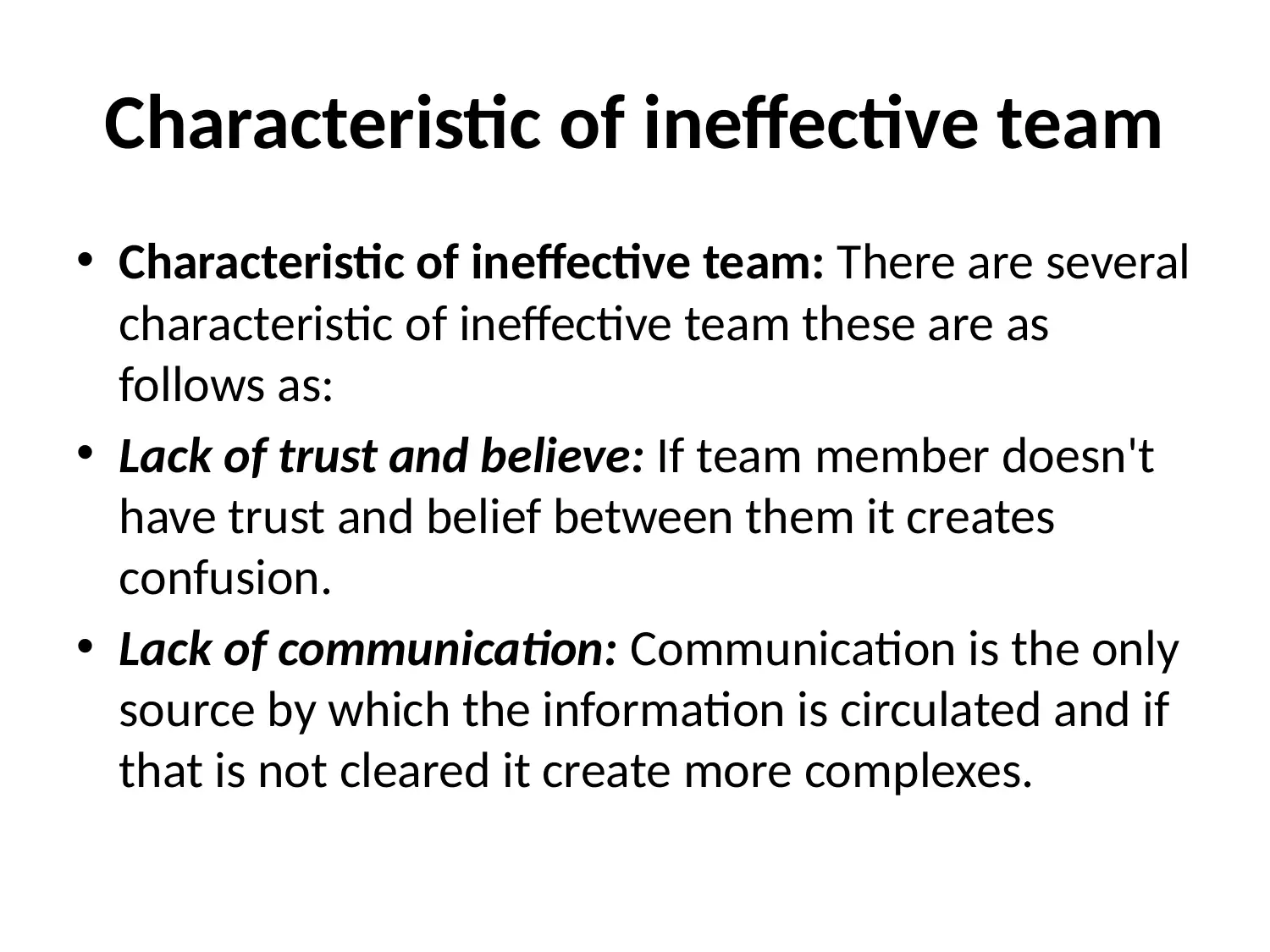
Characteristic of ineffective team
• Characteristic of ineffective team: There are several
characteristic of ineffective team these are as
follows as:
• Lack of trust and believe: If team member doesn't
have trust and belief between them it creates
confusion.
• Lack of communication: Communication is the only
source by which the information is circulated and if
that is not cleared it create more complexes.
• Characteristic of ineffective team: There are several
characteristic of ineffective team these are as
follows as:
• Lack of trust and believe: If team member doesn't
have trust and belief between them it creates
confusion.
• Lack of communication: Communication is the only
source by which the information is circulated and if
that is not cleared it create more complexes.
Paraphrase This Document
Need a fresh take? Get an instant paraphrase of this document with our AI Paraphraser
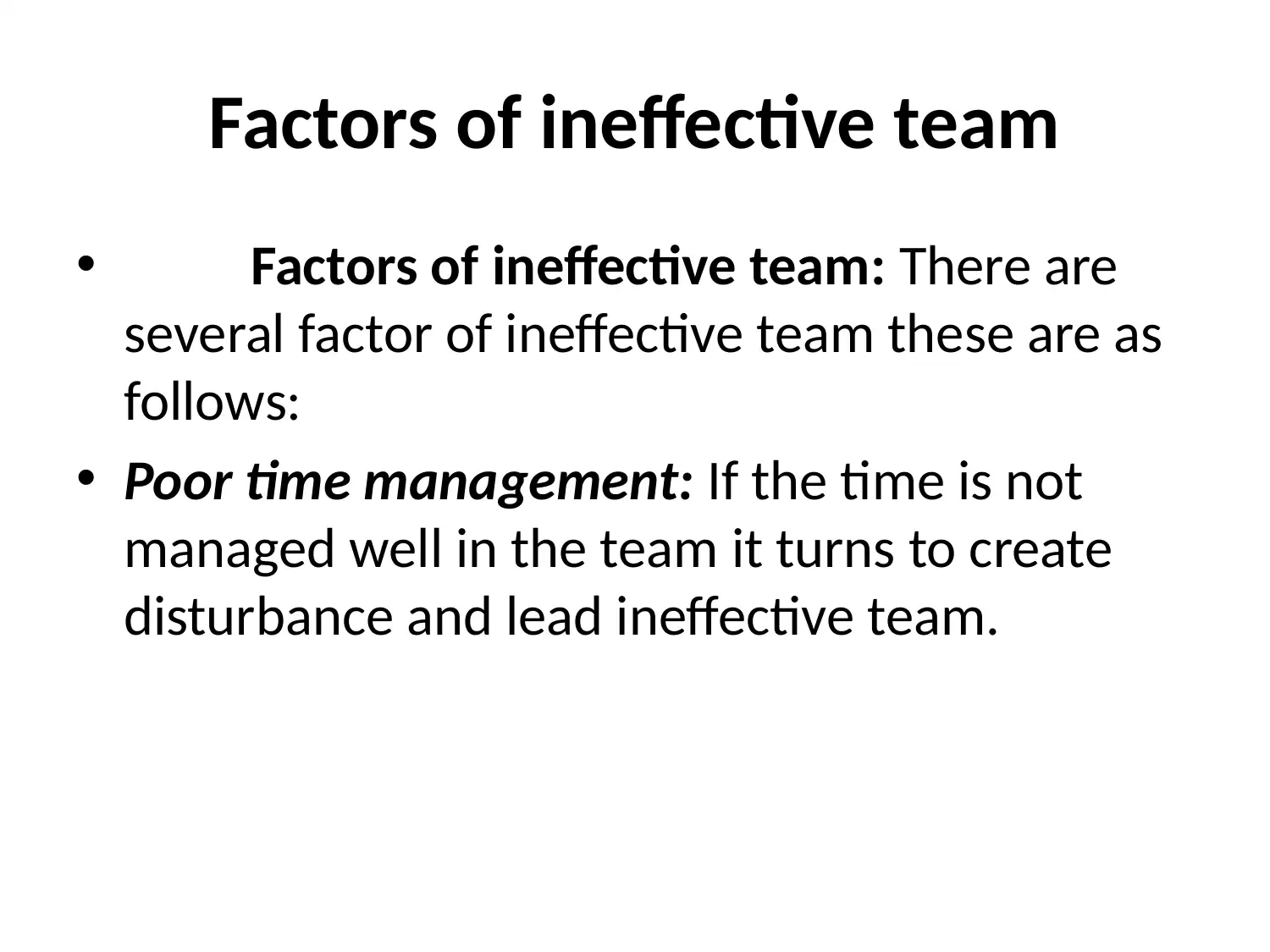
Factors of ineffective team
• Factors of ineffective team: There are
several factor of ineffective team these are as
follows:
• Poor time management: If the time is not
managed well in the team it turns to create
disturbance and lead ineffective team.
• Factors of ineffective team: There are
several factor of ineffective team these are as
follows:
• Poor time management: If the time is not
managed well in the team it turns to create
disturbance and lead ineffective team.
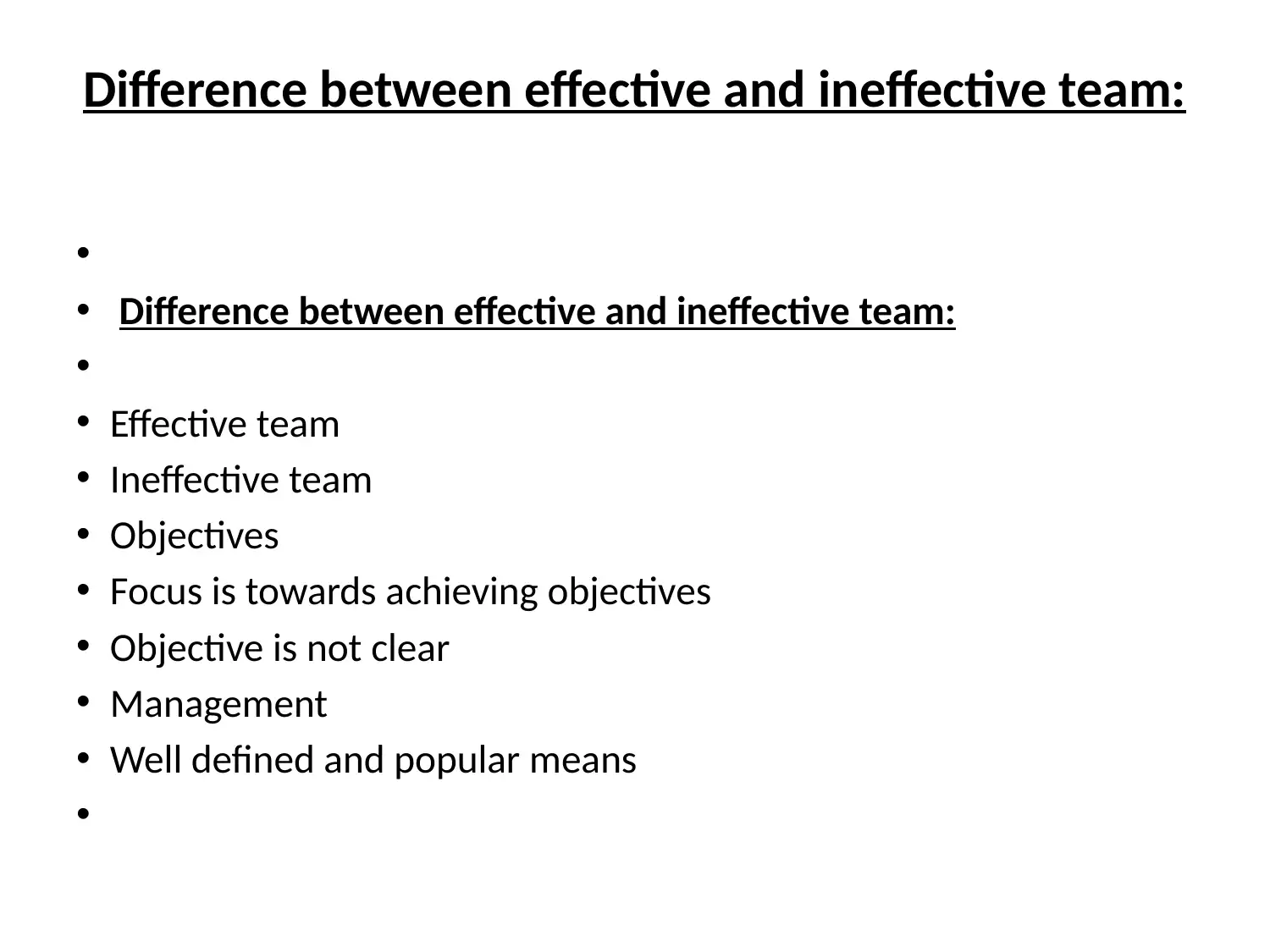
Difference between effective and ineffective team:
•
• Difference between effective and ineffective team:
•
• Effective team
• Ineffective team
• Objectives
• Focus is towards achieving objectives
• Objective is not clear
• Management
• Well defined and popular means
•
•
• Difference between effective and ineffective team:
•
• Effective team
• Ineffective team
• Objectives
• Focus is towards achieving objectives
• Objective is not clear
• Management
• Well defined and popular means
•
⊘ This is a preview!⊘
Do you want full access?
Subscribe today to unlock all pages.

Trusted by 1+ million students worldwide
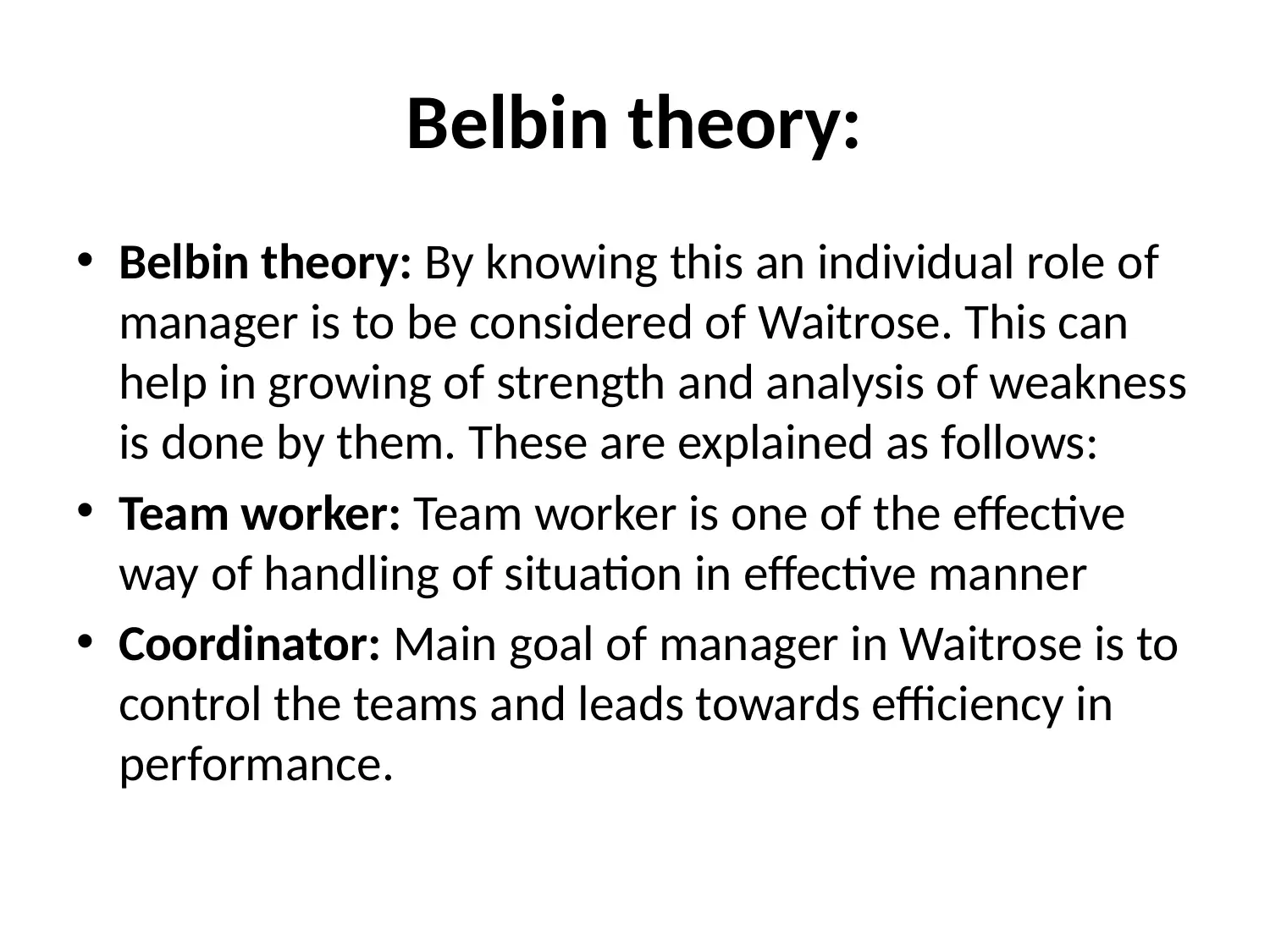
Belbin theory:
• Belbin theory: By knowing this an individual role of
manager is to be considered of Waitrose. This can
help in growing of strength and analysis of weakness
is done by them. These are explained as follows:
• Team worker: Team worker is one of the effective
way of handling of situation in effective manner
• Coordinator: Main goal of manager in Waitrose is to
control the teams and leads towards efficiency in
performance.
• Belbin theory: By knowing this an individual role of
manager is to be considered of Waitrose. This can
help in growing of strength and analysis of weakness
is done by them. These are explained as follows:
• Team worker: Team worker is one of the effective
way of handling of situation in effective manner
• Coordinator: Main goal of manager in Waitrose is to
control the teams and leads towards efficiency in
performance.
Paraphrase This Document
Need a fresh take? Get an instant paraphrase of this document with our AI Paraphraser
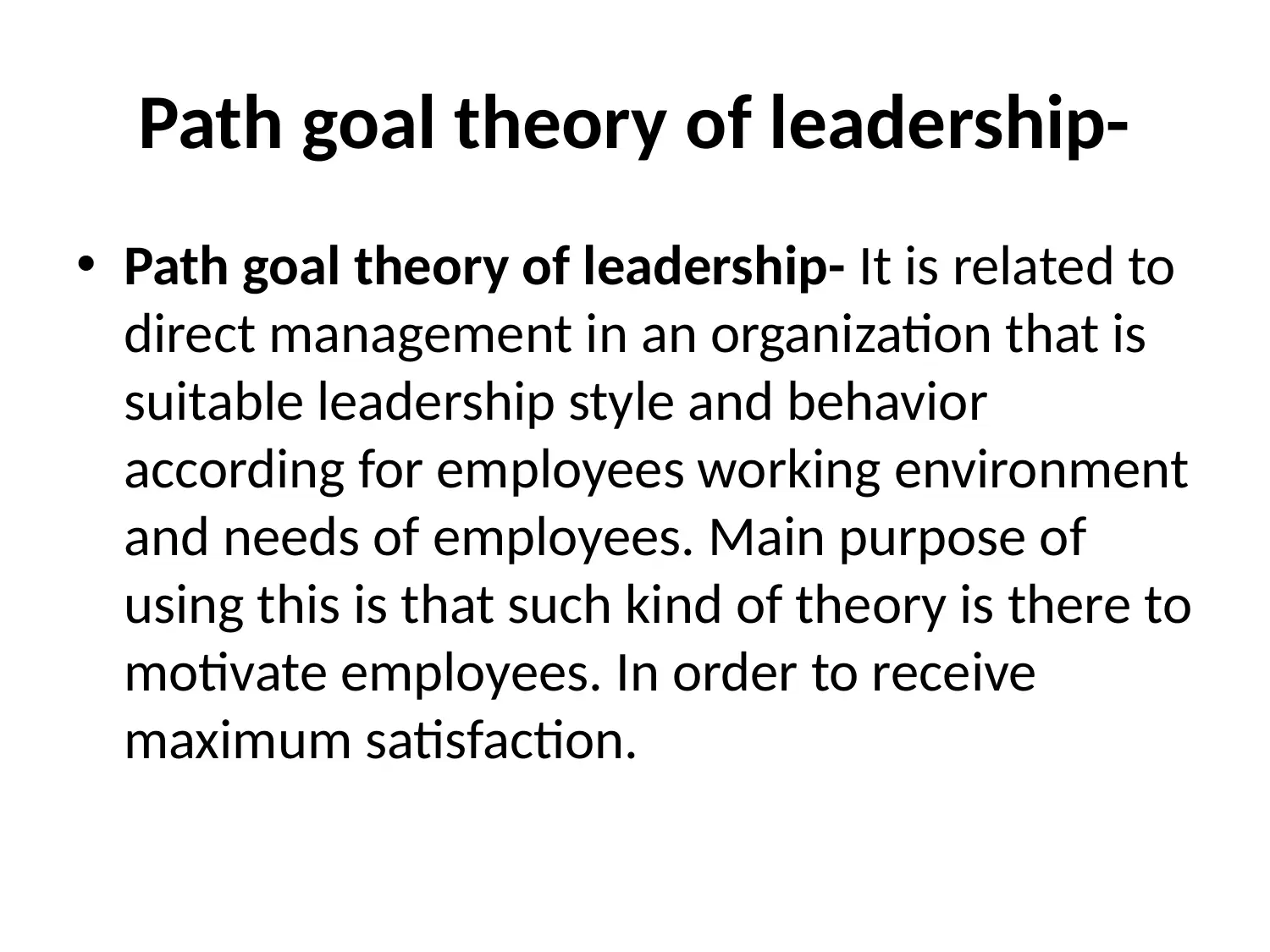
Path goal theory of leadership-
• Path goal theory of leadership- It is related to
direct management in an organization that is
suitable leadership style and behavior
according for employees working environment
and needs of employees. Main purpose of
using this is that such kind of theory is there to
motivate employees. In order to receive
maximum satisfaction.
• Path goal theory of leadership- It is related to
direct management in an organization that is
suitable leadership style and behavior
according for employees working environment
and needs of employees. Main purpose of
using this is that such kind of theory is there to
motivate employees. In order to receive
maximum satisfaction.
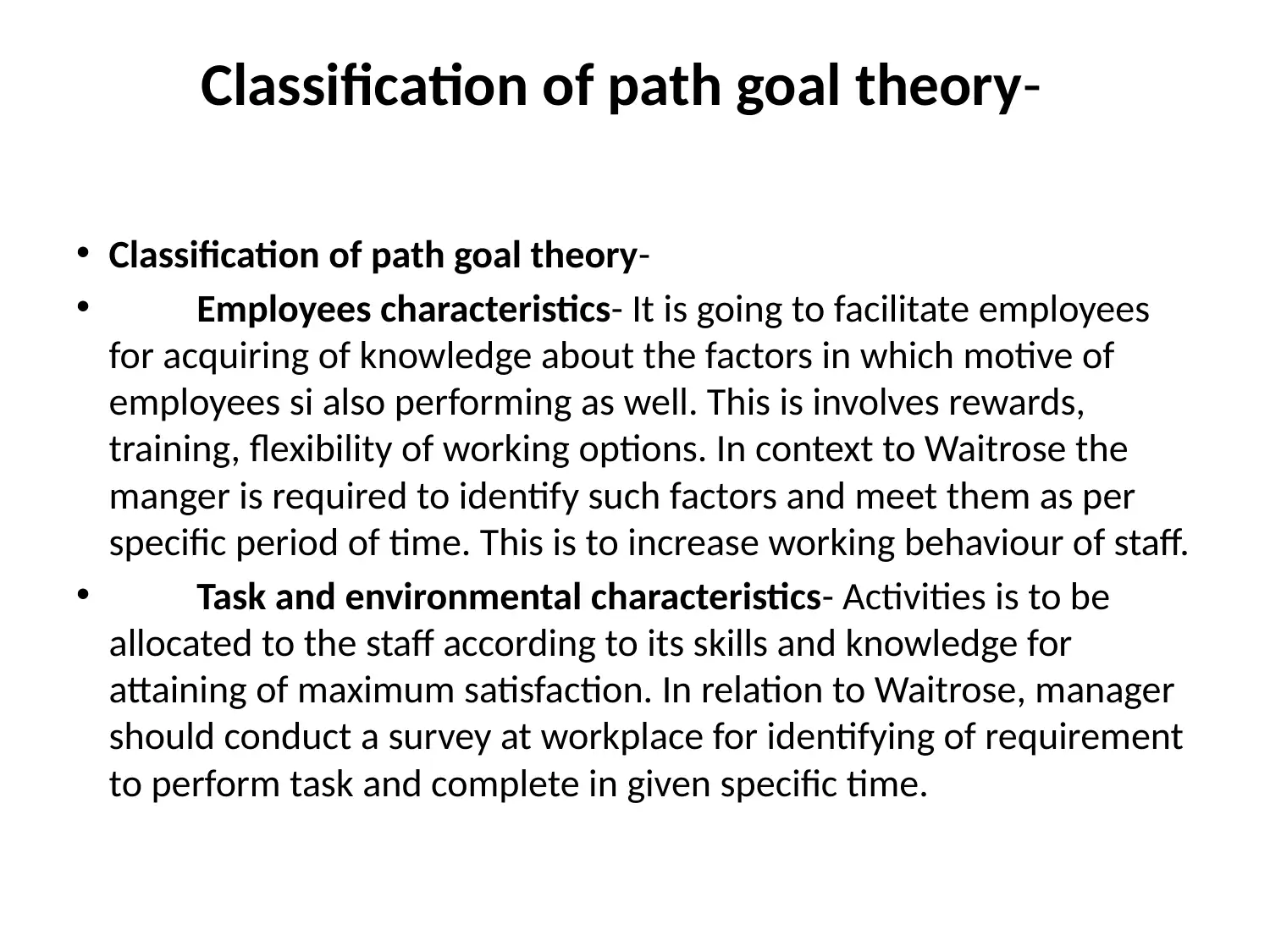
Classification of path goal theory-
• Classification of path goal theory-
• Employees characteristics- It is going to facilitate employees
for acquiring of knowledge about the factors in which motive of
employees si also performing as well. This is involves rewards,
training, flexibility of working options. In context to Waitrose the
manger is required to identify such factors and meet them as per
specific period of time. This is to increase working behaviour of staff.
• Task and environmental characteristics- Activities is to be
allocated to the staff according to its skills and knowledge for
attaining of maximum satisfaction. In relation to Waitrose, manager
should conduct a survey at workplace for identifying of requirement
to perform task and complete in given specific time.
• Classification of path goal theory-
• Employees characteristics- It is going to facilitate employees
for acquiring of knowledge about the factors in which motive of
employees si also performing as well. This is involves rewards,
training, flexibility of working options. In context to Waitrose the
manger is required to identify such factors and meet them as per
specific period of time. This is to increase working behaviour of staff.
• Task and environmental characteristics- Activities is to be
allocated to the staff according to its skills and knowledge for
attaining of maximum satisfaction. In relation to Waitrose, manager
should conduct a survey at workplace for identifying of requirement
to perform task and complete in given specific time.
⊘ This is a preview!⊘
Do you want full access?
Subscribe today to unlock all pages.

Trusted by 1+ million students worldwide
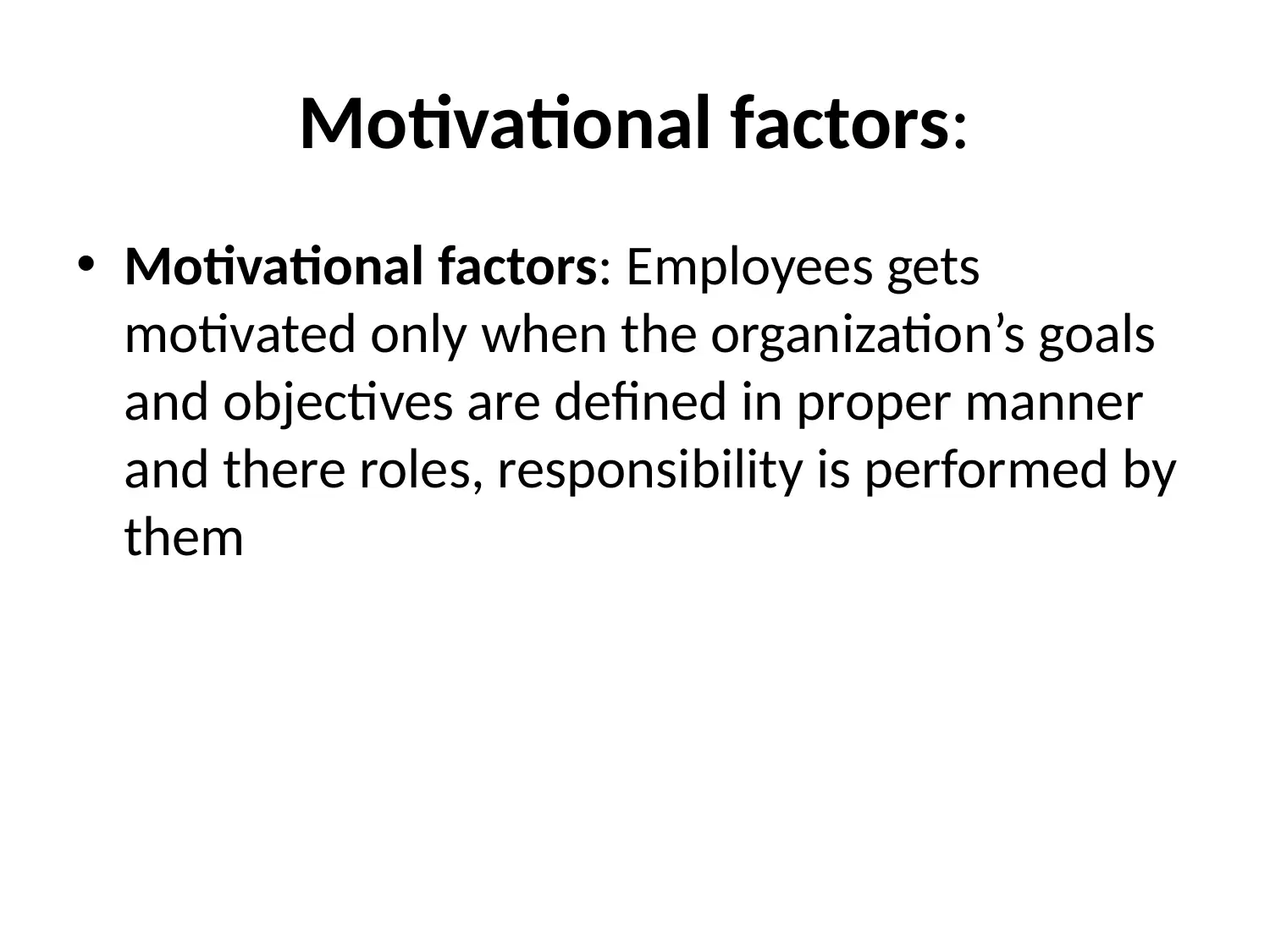
Motivational factors:
• Motivational factors: Employees gets
motivated only when the organization’s goals
and objectives are defined in proper manner
and there roles, responsibility is performed by
them
• Motivational factors: Employees gets
motivated only when the organization’s goals
and objectives are defined in proper manner
and there roles, responsibility is performed by
them
Paraphrase This Document
Need a fresh take? Get an instant paraphrase of this document with our AI Paraphraser
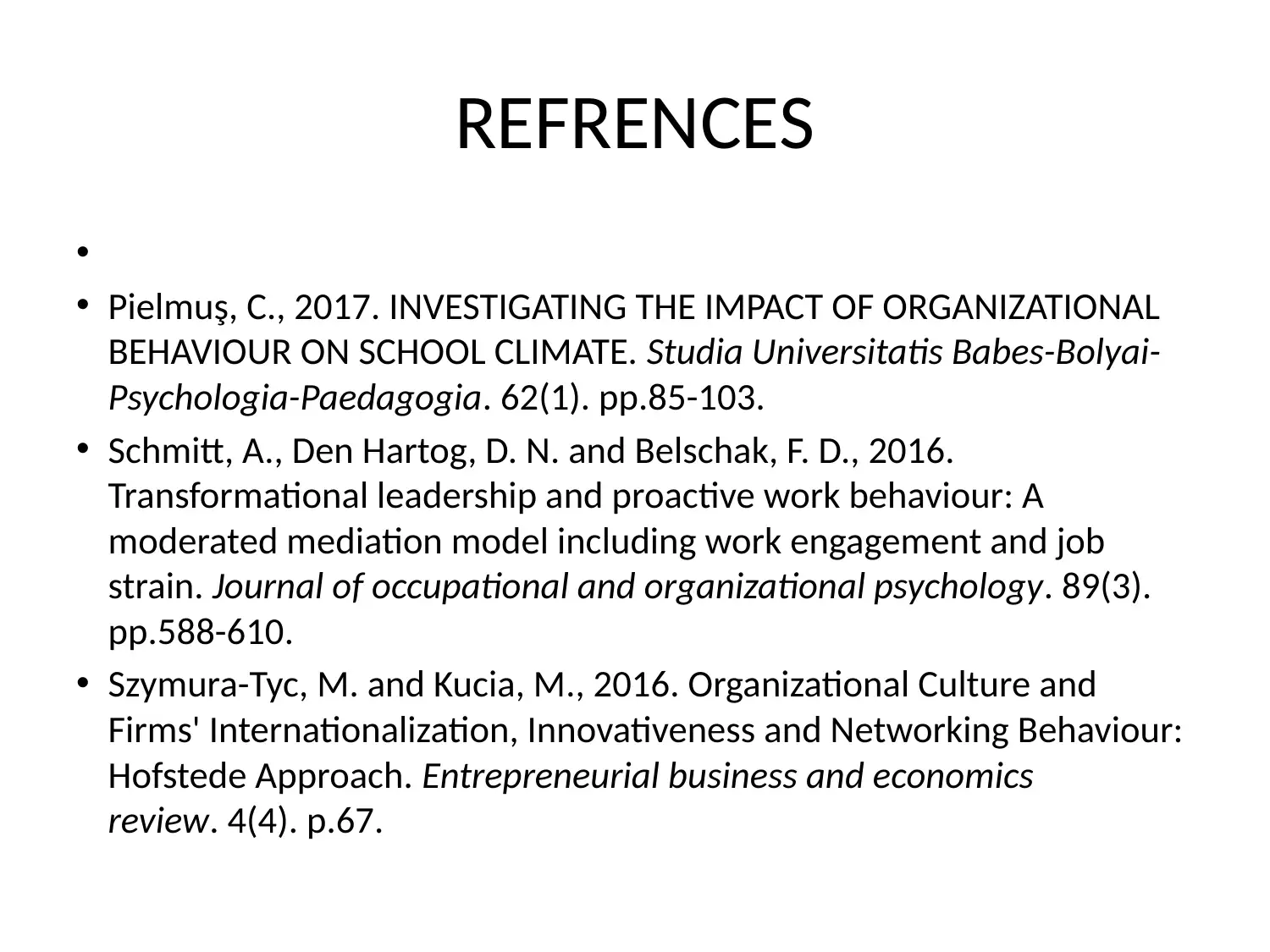
REFRENCES
•
• Pielmuş, C., 2017. INVESTIGATING THE IMPACT OF ORGANIZATIONAL
BEHAVIOUR ON SCHOOL CLIMATE. Studia Universitatis Babes-Bolyai-
Psychologia-Paedagogia. 62(1). pp.85-103.
• Schmitt, A., Den Hartog, D. N. and Belschak, F. D., 2016.
Transformational leadership and proactive work behaviour: A
moderated mediation model including work engagement and job
strain. Journal of occupational and organizational psychology. 89(3).
pp.588-610.
• Szymura-Tyc, M. and Kucia, M., 2016. Organizational Culture and
Firms' Internationalization, Innovativeness and Networking Behaviour:
Hofstede Approach. Entrepreneurial business and economics
review. 4(4). p.67.
•
• Pielmuş, C., 2017. INVESTIGATING THE IMPACT OF ORGANIZATIONAL
BEHAVIOUR ON SCHOOL CLIMATE. Studia Universitatis Babes-Bolyai-
Psychologia-Paedagogia. 62(1). pp.85-103.
• Schmitt, A., Den Hartog, D. N. and Belschak, F. D., 2016.
Transformational leadership and proactive work behaviour: A
moderated mediation model including work engagement and job
strain. Journal of occupational and organizational psychology. 89(3).
pp.588-610.
• Szymura-Tyc, M. and Kucia, M., 2016. Organizational Culture and
Firms' Internationalization, Innovativeness and Networking Behaviour:
Hofstede Approach. Entrepreneurial business and economics
review. 4(4). p.67.
1 out of 11
Related Documents
Your All-in-One AI-Powered Toolkit for Academic Success.
+13062052269
info@desklib.com
Available 24*7 on WhatsApp / Email
![[object Object]](/_next/static/media/star-bottom.7253800d.svg)
Unlock your academic potential
Copyright © 2020–2026 A2Z Services. All Rights Reserved. Developed and managed by ZUCOL.




